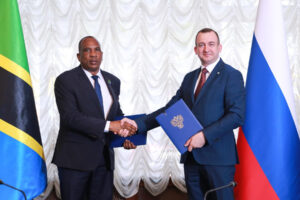- Russia and Tanzania unite to double trade, boost Africa market access
- History as Janngo Capital seals Africa’s largest gender-equal $78M tech VC fund
- South Africa Budget Disappoints Investors as Deficit Widens
- Kenya drops to 6th place in Africa trade barometer
- Tanzania’s bold move to boost cashew nut exports by 2027
- Chinese cities dominate global list of places occupied by billionaires
- Sudan tops up as Africa aims for $25 billion development fund
- Opportunities for youth: Tech firms Gebeya and NVIDIA to train 50,000 developers in Africa
Author: Laurence Sithole
I am a financial services professional with a strong background in diverse areas of banking. My skill set includes among others International Banking, Trade Finance, Commercial Lending, Customer Service, Finance, Banking, Corporate Finance, and Investment Banking. Africa is my home and I am passionate about its development,
The reasons for the current position are both economic and political. The intent of this article is to explore the economic side of the country's decline with the view to put forward new areas of economic significance that can give rise to the recovery of the country's fortunes.
These new areas if adopted and implemented will most certainly result in economic green shoots and with time they will transform into major industries anchoring the economy on the same scale and extent that mining and agriculture did in the former years.
The political side of the equation of Zimbabwe's economic decline has been written about extensively and it is beyond the scope of this article. However, it must be noted and borne in mind that it is immensely difficult to separate politics from economics as these two concepts enjoy a very strong symbiotic relationship.…
[elementor-template id="94265"]
Pursuing economic empowerment through purely legalistic and regulatory means has fatal shortcomings which defeat the premise of black or native participation in the economy because history has taught that such a strategy creates a very skewed distribution of the wealth that must be sustainably shared.
Black Economic Empowerment and Indigenization pursued solely from this strategy is a sophisticated form of socialism especially where there is little in the way of economic growth. Its process and eventual outcome create a skewed wealth distribution and novel kind of class structure.
A vibrant economy is the most potent instrument of empowerment, inclusion, and participation of the people of that country. Vibrant economies are not the result of chance but are the result of deliberate pursuit and action.
Read: Three things TMEA brings to Ethiopia in expansion plans
Creating an economy that is enabling and empowers all citizens requires the development of the following
Economic transformation in Zimbabwe requires the nation to look carefully at where the rest of the world is going. The rest of the world is in the middle of the third industrial revolution driven by technology and services. These two comprise what is now known as the knowledge economy and represent a clear departure from the significance of the primary/extractive and secondary industries. These same industries are what have anchored the economy from the time the southern African country became a nation. Technology and services are where the greatest value can be appropriated, and it is in technology and services where the key to exponential growth in productivity lies.
The most magnificent thing about technology and services is that it pervades every sector of the economy and we have seen it converge with just about every area of the economy in recent times. The concept of the internet of things…
Oude Meester the alcoholic spirits brand once carried an advert many years ago that described the life trajectory of a successful businessman or businesswoman in a leading South African business weekly. In that advert was a picture of a bottle of brandy and its image was a timeline of the journey a businessperson takes starting right at the bottom when his or her entrepreneurial journey begins having started a business, grows that business, listing it on the Johannesburg Stock Exchange and then culminates in that individual running for president of the country.
The advert drew its context from the times. Back then Cyril Ramaphosa and Tokyo Sexwale, political stalwarts within the establishment of the African National Congress had taken sabbaticals from the political sphere and had gone on to achieve notable success in the private sector. Both men had expressed ambition for the presidency. Only one of these men succeed …
South Africa was already in a precarious economic position and did not need the recent social unrest that engulfed its main provinces. It was bad enough that the economy according to the IMF had contracted by 7% in 2020 due to COVID-19 induced shocks through lockdown, stoppages to economic activities and resultant job losses. The new threat to economic recovery that has emerged looks certain to push the country over the precipice to economic collapse in the worst case and in the best case, make its recovery slow and painful. Whichever way the die goes, it remains a serious catch-22 situation. The world watched with shock and horror at images out of South Africa of certain members of that society protesting and subsequently looting and wreaking havoc on privately owned businesses. What had begun as an isolated incident in the country’s KwaZulu Natal province quickly degenerated into a national crisis …
Despite the vulnerabilities to the economy from the riots and the pandemic as well as low growth of the former president’s administration, the high prices of commodities bode well for the economic outlook of the country.
A single caveat is in order here which is to ask how sustainable this economic position is.
Commodity prices are expected to remain buoyant on account of planned infrastructure spending in the US and spending and adoption of renewable energy. This will be positive for commodities going forward into the future.…
Other world markets followed suit documenting record lows across the board. On the Johannesburg Stock Exchange (JSE), Business Day reported that the worst losses around the same period were approximately ZAR3.3 trillion which was at that time around two-thirds of South Africa’s GDP.
“SA’s main stock index plunged almost 10% on Thursday (12th March 2020), the biggest drop since October 1997 when global markets were in the midst of the Asian financial crisis.” …
[elementor-template id="94265"]
Practically speaking, it is not difficult to invest offshore. It is not illegal. It is perfectly legal.
There are no guarantees that investments made offshore will perform better than those available locally. FNB the South African bank says that diversifying share portfolio geographically has similar benefits to diversifying across asset classes.…
[elementor-template id="94265"]
Whatever the reason, the outcome was that most notable BEE transactions went to Patrice Motsepe’s African Rainbow Minerals and Ubuntu Botho Investments, Tokyo Sexwale’s Mvelaphanda Holdings and the current President Cyril Ramaphosa’s Shanduka Investments which is now part of the Pembani Group.
Legislated empowerment whose focus was primarily on ownership levels produced heavily skewed results towards benefitting political stalwarts and not the broader masses that were previously disadvantaged during apartheid. …
[elementor-template id="94265"]
The financial services space is being disrupted by new entrants that are nimble and more innovative. The overwhelming result of this has been the closure of bank branches right across the broad spectrum of the banking sector and across the country.
Whenever a branch closes press space is taken up by the banks running adverts citing the growth and advent of mobile technology to be the cause of bank branch closures. To the passive reader it would then look as though technological advancements, growth, and adoption together with the prosperity of banks with respect to their branch networks are mutually exclusive.…
[elementor-template id="94265"]




